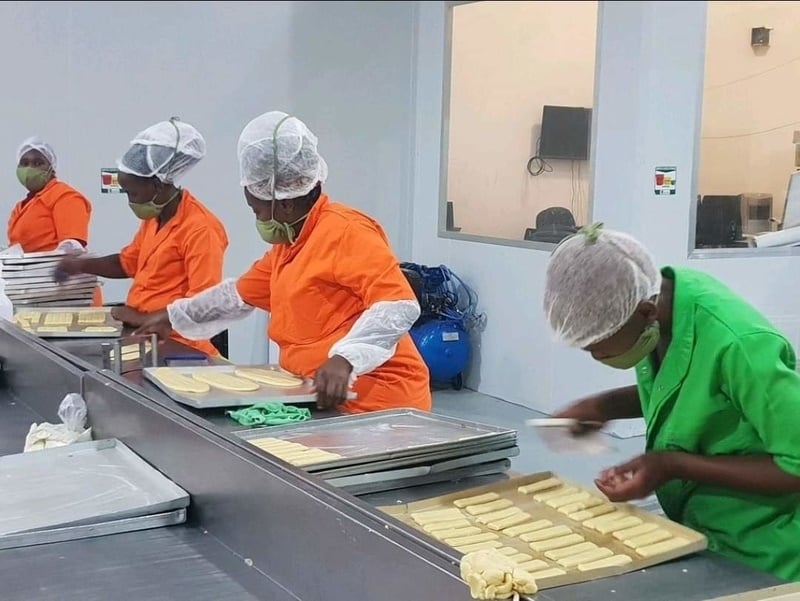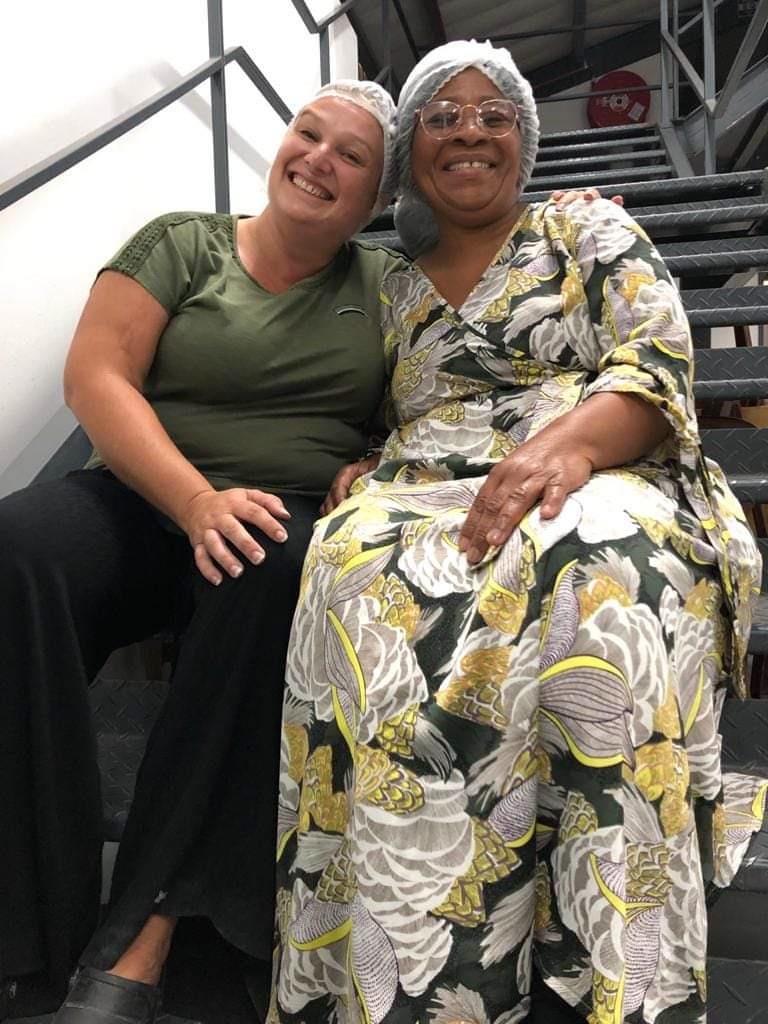


Women hard at work in the factory. (Supplied by Khayelitsha Cookies)
- Khayelitsha Cookies in Cape Town, which employs almost 100 female breadwinners, faces an uncertain future.
- Over 65% of its revenue came from the hospitality industry before hotels closed due to the lockdown.
- The Cape Chamber of Commerce and Industry says the hospitality and tourism sectors, which are a large part of the Western Cape economy, have probably been hardest hit by the lockdown rules.
Almost 100 women in Cape Town who bake goods for Khayelitsha Cookies, a supplier to the hospitality industry, may lose their breadwinner status as the effect of the lockdown takes its toll.
Many South Africans would have seen the company’s individually wrapped biscuits at tea and coffee stations in their hotel rooms, or in airport lounges, conference centres and large offices – a product which makes up over 65% of total revenue.
But when the lockdown was announced in March due to the Covid-19 pandemic, business all but ground to a halt.
Managing director Adri Williams says they were left with over 200 000 biscuits that were baked for the hotels in March, and due to expire at the end of August.
With her head spinning and blood pressure dropping – after looking at the financials – she took to social media on Tuesday to beg for help. She hoped South Africans would buy some of the cookies or help her sell them so the business could stay afloat.
Huge response
Within days, she was left with around 58 000 biscuits.
She said:
I could never in my life have anticipated or expected such a response from people willing to stand united and hear our plea.
One family contacted her all the way from Malawi to order two boxes – not for their own enjoyment but rather to be delivered to night shelters.
“At heart, most people don’t want to see any business close down or lose jobs.”
Williams is working furiously behind the scenes to find other sustainable sources of revenue.
She says that hotels indicated to her that even if they opened up for leisure trade, they could not commit to stocking the biscuits in their rooms as they were sitting with their own losses.



Adri Williams and Eunice Nyobole. (Supplied by Khayelitsha Cookies)
Her staff now work only on Mondays and Tuesdays. They had pinned their hopes on payouts from the Unemployment Insurance Fund but have not had much luck due to an apparent backlog in claims.
“There is nothing worse than walking into an empty factory with people not working,” she says.
“We are on three days short time to try and not retrench and hanging on for dear life.”
The company is 51% black-owned, 100% female-owned, and its employees have a 30% shareholding in the business with Williams holding all the risk.
Most of their staff, from Khayelitsha and Elsies River, cannot read, write or speak English well, so it was difficult for them to find other jobs.
Over the years, the women have been able to improve their living conditions and support between five and seven family members with their salary.
For Eunice Nyobole, 59, who worked her way up from a bakery manager to HR director and co-owner, it’s a sad state of affairs.
“Hotels have closed and most of them, I don’t think they are going to open again,” she sighs.
Previously used to working long hours in a restaurant, her job had allowed her to spend more time with her daughter and family.
“I support a lot of my family, I can’t even say how many… there is nothing I can do [if we close]. I don’t have other options, especially at my age.”
Not giving up
Williams says they are launching a new cookie for August and are not giving up.
“The real ubuntu is in the factory. If we suffer, we all suffer together. We are not going to cast out some of the flock to save the rest.”
Cape Chamber of Commerce and Industry president Geoff Jacobs tells News24 that the hospital and tourism sectors – which are a large part of the Western Cape economy – have probably been the hardest hit by the lockdown rules.
“We often focus on the big hotel groups but forget about the small traders which support these groups,” he says, adding that the knock-on effect is massive.
“While we recognise the need of the lockdown, some of the rules and regulations have been overreach on the part of government and have been nonsensical.”
Sixty percent of their members were small to medium enterprises and feeling the economic impact.
Some businesses were doing well and had managed to reinvent themselves, moving their enterprise online.
“We do know that many businesses will not survive, particularly with the double whammy of load shedding.”

